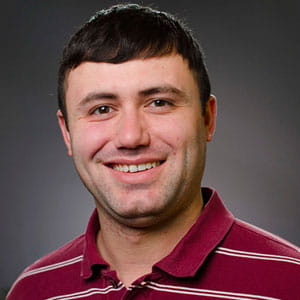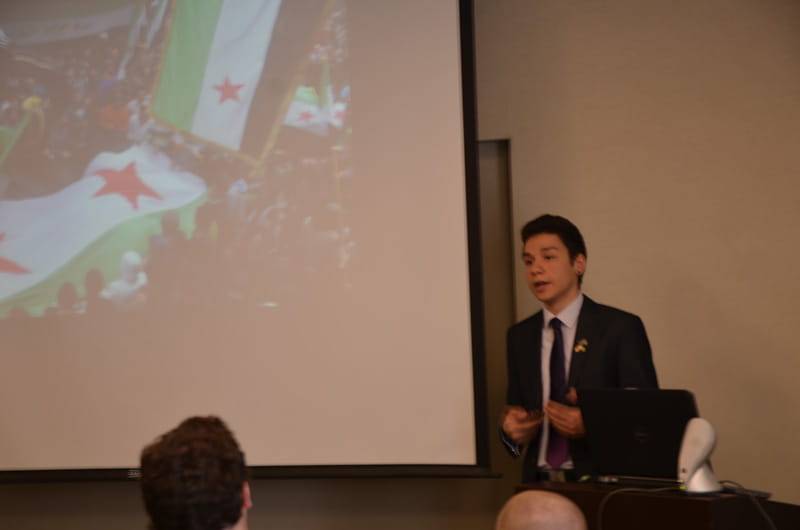From Syria to Drexel: Freshman Tells His Rebel Story
 By Frank Otto
By Frank Otto
Mahmoud Hallak nodded slowly as he was asked about unrest over the last year in places like Baltimore and Ferguson, Missouri,
“I know what they are feeling,” he said. “They want justice. I can understand that.”
Hallak, a 19-year-old Drexel freshman studying chemical engineering, doesn’t just speak from a position of removed empathy. He's demonstrated himself — and paid for it in blood. Just a little over two years ago, Hallak had to quietly suffer through a grenade wound he recieved while attending another kind of demonstration: One protesting the actions of the Bashar al-Assad regime in Syria.
“What we were demonstrating for was justice,” Hallak explained.
Hallak was the speaker April 30 at the latest International Café, a semi-regular event that is held by Drexel International Area Studies to broaden the understanding students have of the world.
Filling room 2019 in MacAlister Hall, students and professors listened as Hallak explained the recent history of Syria and how the Assad family came to power through a 1970 military coup, then cemented their influence in subsequent years.
Unrest began in 2011, Hallak said, after schoolchildren in Daraa were arrested and allegedly tortured when anti-government graffiti was found on the walls of their schools. This served as the flashpoint for anti-Assad sentiments that had been simmering in the country for years.
A native of Aleppo, Hallak lived with his father, mother and two sisters. Aleppo is Syria’s financial capital, so when demonstrations initially began, the city was largely neutral and Hallak, his family and Aleppo’s citizens were largely unaffected.
Government crackdowns on the demonstrations became increasingly violent, however. Hallak’s father, Sakher, was a doctor and set out to aid some of those wounded in them, a dangerous proposition.

“If you helped anyone who was protesting against the government, even saving their lives, it was considered treason," Hallak said.
Eventually, Hallak’s father was found dead on the side of a road, showing signs of torture.
It was around then that Hallak began throwing his support behind the demonstrators and the rebel faction, the Free Syrian Army. Hallak helped form the Torches of Freedom, an anti-Assad group that helped coordinate demonstrations and spread news of what was going on across the country.
The group used Skype to communicate because it was harder for the Assad government to track.
“If we talked over Facebook or any instant messenger, the government would hack into it and easily find out who we were,” Hallak said.
Demonstrations proved deadly. Funerals for those killed in the demonstrations typically begat more demonstrations. Hallak showed videos he’d taken from the funeral processions that were filled with singing and dancing.
“We celebrate the honor of what they did, demonstrating,” Hallak said. “There is much sadness but pride. We dance, we sing, we celebrate the people giving their lives, but most of them end with more dead.”
He showed another video that featured automatic gunfire during one such funeral procession.
“The government did not respect any religion or any lives,” Hallak said.
It was during one of these surprise attacks from government forces that Hallak was wounded.
Although the shrapnel wound in his waist was relatively minor, it still likely required professional treatment. However, the government monitored the hospitals.
“If you are injured, that is a sign you were in a protest,” Hallak told his audience. “And the government will torture you for any information.”
So Hallak took care of the wound on his own and even kept it from his mother.
“I packed it with napkins and then I had a fever,” he said, smiling a little. “[My mother] would be upset. I was like, ‘Mom, I’m sick. I just have a fever.’”
The Free Syrian Army began liberating cities from government forces to protect civilians. However, Assad’s forces began shelling entire neighborhoods where rebel activity was supposedly taking place. The block where Hallak’s friend lived, near Hallak’s home, was completely destroyed.
He isn’t sure escalating the demonstrations to a full civil war was the exact right course of action, but Hallak also feels it may have been unavoidable.
“Did we want this to happen? No,” he said. “Assad set a trap, and he was very smart because we had to take it … I personally believe the Free Syrian Army was doing the right thing, but they didn’t have to do it the way they did it.”
Things became too violent for Hallak and his family to remain in Syria. They were able to escape to Turkey, like many Syrian refugees. There, they stayed with his mother’s cousin, a Turkish citizen, before Hallak went to live with his uncle in Montgomery County, Pennsylvania. His older sister ended up in Sweden.
Hallak already had a U.S. visa but his mother and sisters did not.
“It’s almost impossible to get one now. They’re afraid of Syrians,” Hallak said. “There’s no way to get my mom and little sister here now.”
After two years and seemingly unending background interviews, Hallak received political asylum in the United States. His uncle was able to support him through high school, but after that, he needed to go out on his own.
Initially, Hallak didn’t think he’d be able to go to college, that he wouldn’t be able to afford it. Then, in a last ditch effort, he reached out to Drexel to see if it could provide any financial assistance — and he got a full ride.
Hallak wants to go to medical school and become a doctor, like his father. Although he’s busy with the regular course load that any undergraduate chemical engineering student can expect, Hallak’s mind remains on Syria.
He keeps tabs on the situation by checking websites and reaching out to trusted contacts on the ground. Facebook and other social media are safe now because the people he talks to are in liberated areas and don’t need to worry about government monitoring.
A new, scary threat is ISIS, the group continuing to carve up the country and cause strife.
“When division starts, it doesn’t end,” Hallak said.
Although Hallak is keeping astride of the political and military developments there, his heart is really with the civilians in the conflict. That’s whom he wants to help once he becomes a doctor.
“Let’s pray for Syria,” he urged at the close of his presentation.